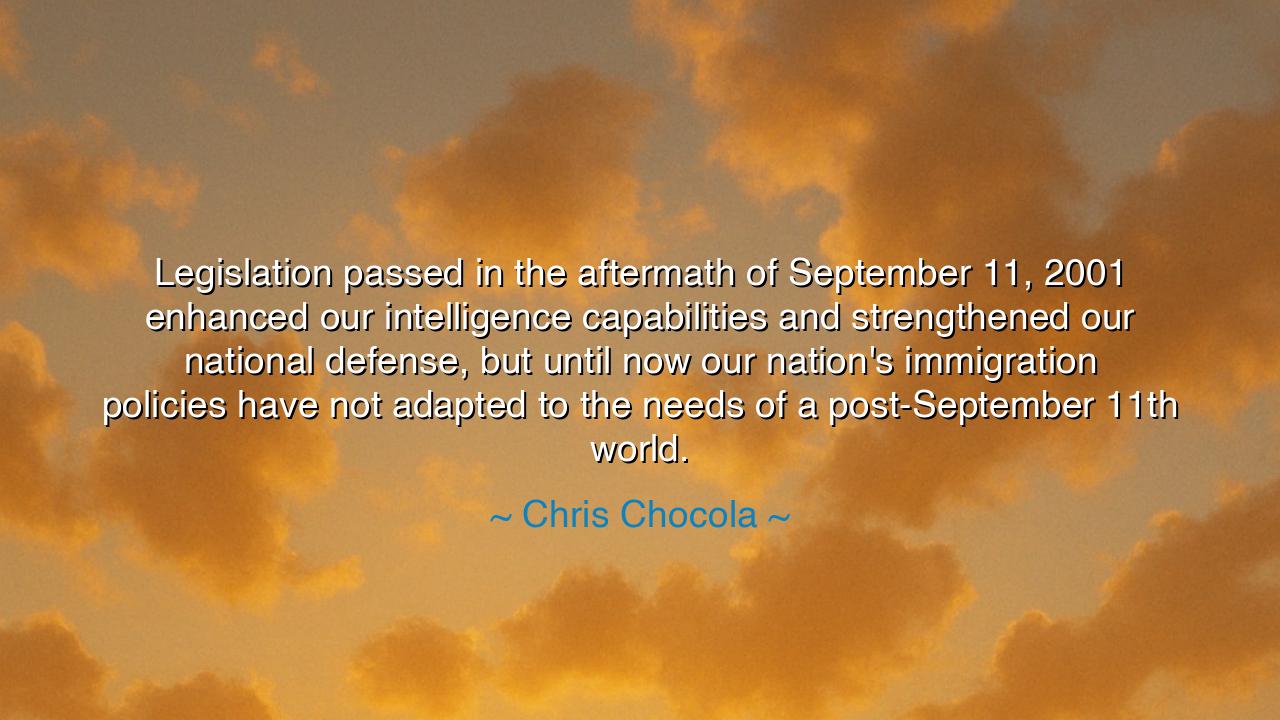
Legislation passed in the aftermath of September 11, 2001
Legislation passed in the aftermath of September 11, 2001 enhanced our intelligence capabilities and strengthened our national defense, but until now our nation's immigration policies have not adapted to the needs of a post-September 11th world.






When Chris Chocola declared, “Legislation passed in the aftermath of September 11, 2001 enhanced our intelligence capabilities and strengthened our national defense, but until now our nation’s immigration policies have not adapted to the needs of a post-September 11th world,” he spoke as one reflecting upon the transformation of an age. His words were not simply about policy or politics—they were about change, about the evolution of a people shaken by tragedy and awakened to new realities. In them, we hear the voice of a leader confronting the eternal tension between security and openness, between the preservation of a nation’s safety and the preservation of its soul.
The origin of this quote lies in the shadow of the September 11 attacks—an event that tore through the illusions of invulnerability held by an entire generation. In the aftermath, the United States, like a wounded giant, gathered its strength, reshaping its defenses and fortifying its intelligence networks. From this crucible came acts such as the Patriot Act, the creation of the Department of Homeland Security, and the vast reorganization of agencies tasked with protecting the homeland. These measures reflected a nation’s determination to never again be caught unprepared. Yet, as Chocola observed, one vital element lagged behind: the adaptation of immigration policy, that delicate gateway between the world and the nation—a place where security, compassion, and sovereignty must meet.
In his words, Chocola expressed not criticism, but a recognition of imbalance. For he understood that the challenges of the post-9/11 world were not of swords and shields alone—they were of people, of the movements of humanity across borders in a time of fear and uncertainty. He saw that while the nation’s military and intelligence systems had grown sharper, its policies governing the flow of travelers, refugees, and workers had not yet adjusted to a reality in which danger could hide behind the face of the ordinary. It was a call not to close the gates of the nation, but to rethink the way those gates are guarded and opened.
The ancients, too, faced this same struggle between vigilance and virtue. In the time of Pericles, when Athens stood as the beacon of democracy and art, it also stood as a city open to the world—welcoming traders, thinkers, and travelers. Yet even in that golden age, the Athenians learned that openness invites both light and shadow. When war and plague struck, voices arose calling for isolation, for closing the ports that had once brought prosperity. Pericles, in his wisdom, taught that the strength of a people lies not in their walls, but in their discernment—their ability to balance freedom with foresight. So too did Chocola, in the modern age, remind his nation that policies must evolve as the world evolves, lest they become relics that endanger rather than protect.
This quote also reflects a deeper truth: that security is not a static achievement but a living process. It is not won once and for all—it must be continually renewed. Just as a farmer tends his fields through each season, adapting to new storms and new pests, so must a nation tend the fields of its laws and systems. Chocola’s statement warns against complacency, the false belief that strength in one area excuses neglect in another. For in the rhythm of history, civilizations often fall not from external invasion, but from inward stagnation—from the failure to adapt their wisdom to the age that surrounds them.
Yet his words carry also a tone of hope. To recognize the need for change is the beginning of wisdom; to act upon it is the beginning of renewal. Chocola’s vision was not of fear, but of responsibility—a call to shape policies that safeguard both the nation’s people and its principles. He speaks to the eternal duty of every generation: to preserve the balance between protection and compassion, to build systems that guard without hardening, and to ensure that in defending the homeland, the spirit of the homeland remains pure.
And so, from his reflection, we may draw a timeless lesson: adaptation is the guardian of endurance. Whether in nations, organizations, or the lives of individuals, the world is ever-changing, and those who refuse to evolve will find themselves overtaken by the tide of time. The wise must learn to strengthen their defenses without imprisoning their hearts, to embrace vigilance without surrendering humanity. As the great teacher Heraclitus once said, “Nothing endures but change.” Therefore, let Chocola’s words remind us that true strength lies not in rigid walls, but in the living wisdom to build anew when the world demands it.
Thus, children of tomorrow, take heed: protect what is sacred, but do not let fear fossilize your vision. Build strong foundations, but let them breathe. For in every age, those who adapt with courage, clarity, and compassion will stand not merely as survivors of their time, but as the architects of the future.






AAdministratorAdministrator
Welcome, honored guests. Please leave a comment, we will respond soon